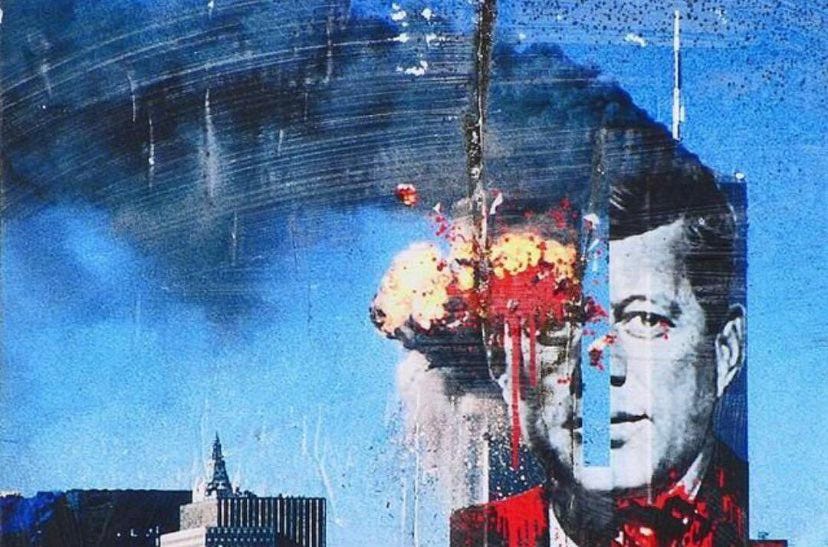From 11/22 to 9/11
An educator on the lifelong influence of his junior high teacher's reaction to the JFK assassination
[This is part of a continuing series of recollections of Nov. 22, 1963. Submit your JFK story in the comments sections here: “Where Were You When?”]
Tobe Berkovitz
3 pm, Friday November 22, 1963
It was time for Mr. Marshall’s American Civics class to begin at Long Lots Junior High School in Westport, Connecticut. Our teacher Mr. Marshall was a big guy. Word was he played football in college. Even ninth grade wise guys didn’t mess around in Mr. Marshall’s class. Mr. Marshall walked in. He looked at the class, lowered the tone of his voice and told us President Kennedy was dead. Shot during a motorcade in Dallas. There were tears in his eyes. Tears in big Mr. Marshall’s eyes.
It was a confusing time filled with sorrow and dread. Everyone was glued to the television watching glowing black and white images of newscasters, politicians, policemen and film of the dead President and the Kennedy family. The crushing end to Camelot.
Nothing like this had happened in America since Abraham Lincoln was assassinated a century ago. Throughout the weekend the strangeness continued as Kennedy’s assassin was found and then shot live on TV in front of our eyes. The nation watched television and mourned during the President’s funeral.
When I was a kid, there was something about television that always fascinated me. I loved TV. Westerns, detective shows, cartoons and especially the news. Odd that a teenager watched the news. Years later I became a lecturer at the University of Connecticut and taught TV production and TV broadcasting. How great was that. Getting paid to teach TV.
9:30 am, Tuesday September 11, 2001.
I’m a professor at Boston University and it was time to begin my Contemporary Mass Communication class. The syllabus read, Sept 11, Segmenting audiences. Media use characteristics. Mass versus specialized media. Reading: Integrated Com, chapter 2; McLuhan chapters 1, 2, 3; “Was Freud a minivan or S.U.V. kind of guy?, ”NYT. Mass Communication was the introductory course for graduate students and this was the third class session, so everything was a little new. The students were new to Boston, graduate school and to their professor.
Before class the halls and offices were buzzing with news that a plane had crashed into the World Trade Towers in New York. Right before class started a second plane crashed into the other tower. Ambiguity evaporated as it became obvious that terrorists were attacking the United States. Nothing like this had happened since Pearl Harbor 60 years ago.
I walked into the classroom looking at my thirty-seven graduate students as they stared at me with frightened eyes. I’m not a big guy, but I was Mr. Marshall. There were no tears in my eyes. Instinctively I knew I had to project calm and authority in the storm of panic that permeated my students. Contemporary Mass Communication analyzed the media and how it affected society. The role of the media in 9/11 became the foundation for the rest of the semester.
I am an animated speaker. Student evaluations of my courses always say I am ‘energetic.’ Actually, I’m hyperactive. But I was calm and focused. I summarized what was happening during the attack, said any student who wanted to call home could do so, then brought the class into the hallway near the building’s TV studios, and as a group we watched as the South Tower collapsed. A shudder went through the students. We went back to the classroom. My teaching assistant stayed in the hall monitoring the news.
Class continued for a little longer with me asking the students to consider how they would be receiving and processing information about the attack. How was TV central to shaping their feelings and perceptions? As I spoke, my teaching assistant returned to the class and whispered that a plane had crashed into the Pentagon. I told the students about the third plane. I dismissed class and wished them and their families well. Several students came up to me and asked if they were safe in the building. I reassured them that everything would be OK and let them know they could call me at anytime if they needed to talk.
My email is <tobetv> but I was unable to watch much television as the events of 9/11 and subsequent days unfolded. TV was unsettling to me. It took months before I started watching TV on a regular basis. I wonder what Mr. Marshall did after the American Civics class.
Tobe Berkovitz, Ph.D. is a communications professor emeritus at Boston University.





Thank you for writing such a prescient article. It sparked a memory of my High School History teacher, Mr Fisher. In 1969, just as the Vietnam war was getting real for 18 year old boys I was 16 in 10th grade.
I was not a great student, but I tended to get decent grades because I thought I was pretty good at figuring out what was important. Later in life I realized that I was lucky to be alive and had to work to achieve anything of value.
Fisher’s class was immediately before lunch and the topic was the economic recovery in the USA after the Great Depression.
I feigned interest, took a few notes, watched the clock and when the bell rang I headed to the cafeteria. I distinctly remember Mr Fisher raising his voice and forcibly stating that “many people feel that this economy needs a war to be waged in order to be sustainable”.
Indeed, truer words were never uttered.